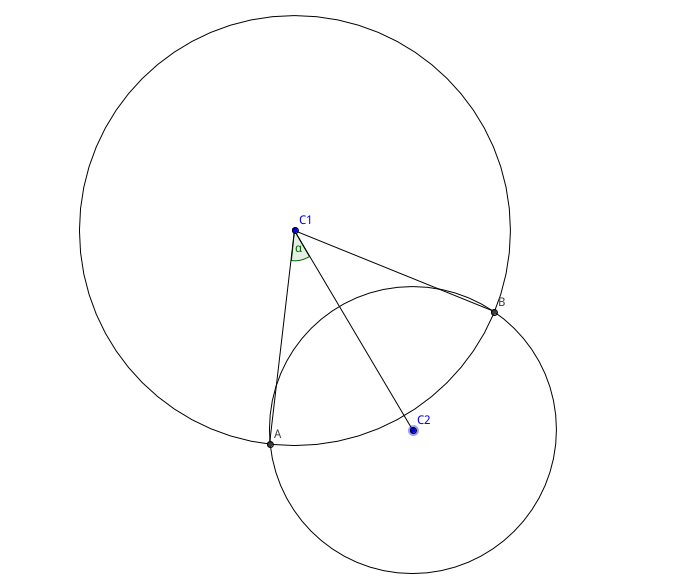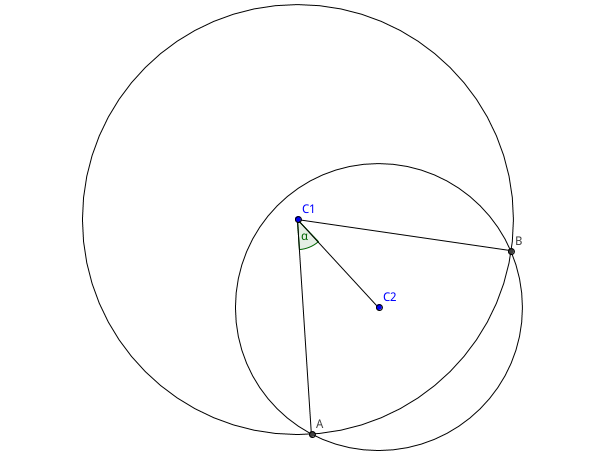BZOJ 1043 下落的圆盘
Description
有n个圆盘从天而降,后面落下的可以盖住前面的。求最后形成的封闭区域的周长。看下面这副图, 所有的红色线条的总长度即为所求. 
Input
n ri xi y1 ... rn xn yn
Output
最后的周长,保留三位小数
Sample Input
2
1 0 0
1 1 0
1 0 0
1 1 0
Sample Output
10.472
HINT
数据规模
n<=1000
这道题目很好嘴巴,但是写起来有点儿蛋疼。
首先求出每个圆盘被他上面的圆盘覆盖的圆心角的度数α,用(2π-α)*c/2π即每个圆盘的周长答案,最后累加一遍答案即可。
那么圆心角要怎么求呢???
算出两个圆的交点肯定是没戏的(我推了很久的公式,还是退错了),后面想想,好像不用去求交点,可以直接用圆心角来计算区间。

如图若两圆C1,C2有交点(C2覆盖C1),则我们可以算出射线C1C2的极角θ。C1被C2所覆盖的圆心角的区间为[θ-α,θ+α]。但是注意,区间可能有越界的情况,比如说我们的区间是(-π,π]他的被覆盖的极角区间就是许多区间的并,但他可能和有[-1.2π,-0.7π],这时我们需要将区间拆开进行处理。比如此例中,我们拆成[-π,-0.7π]与[0.8π,π]。
还有一种情况就是C1的圆心在C2中,α的值为其补角。(自己画画图)。


1 #include<iostream> 2 #include<cmath> 3 #include<algorithm> 4 #include<cstdio> 5 #include<cstdlib> 6 using namespace std; 7 8 #define pi (3.1415926535) 9 #define esp (1e-6) 10 #define maxn 2010 11 int n; double ans; 12 13 inline bool equal(double a,double b) { return fabs(a - b) < esp; } 14 15 inline double qua(double a) { return a * a; } 16 17 inline bool dd(double a,double b) { if (equal(a,b)) return true; return a >= b; } //>= 18 19 inline bool xd(double a,double b) { if (equal(a,b)) return true; return a <= b; } //<= 20 21 struct NODE{ double x,y; }; 22 struct angle 23 { 24 double a1,a2; 25 friend inline bool operator < (angle a,angle b) 26 { 27 if (!equal(a.a1,b.a1)) return xd(a.a1,b.a1); 28 return xd(a.a2,b.a2); 29 } 30 }bac[maxn]; 31 struct CIR 32 { 33 double r,x,y; 34 inline void read() { scanf("%lf %lf %lf",&r,&x,&y); } 35 inline NODE mid() { return (NODE) {x,y}; } 36 inline double calc(NODE p) { return atan2(p.y-y,p.x-x); } 37 inline double C() { return 2*pi*r; } 38 }cir[maxn]; 39 struct LINE 40 { 41 double a,b,c; 42 inline double dis(NODE p) { return fabs(a*p.x+b*p.y+c)/sqrt(qua(a)+qua(b)); } 43 inline double key(NODE p) { return p.x*a+p.y*b+c; } 44 }; 45 46 inline double dis(NODE a,NODE b) { return sqrt(qua(a.x-b.x) + qua(a.y-b.y)); } 47 48 inline bool have(CIR c1,CIR c2) { return dis(c1.mid(),c2.mid())<c1.r+c2.r; } 49 50 inline bool cat(CIR c1,CIR c2) { return xd(dis(c1.mid(),c2.mid()),fabs(c1.r-c2.r)); } 51 52 inline LINE cross(CIR c1,CIR c2) { return (LINE) {2*(c2.x-c1.x),2*(c2.y-c1.y),(qua(c2.r)-qua(c2.x)-qua(c2.y))-(qua(c1.r)-qua(c1.x)-qua(c1.y))}; } 53 54 inline void work() 55 { 56 int tot,i,j; double rest,p,q,a,b,now; LINE l; 57 for (i = n;i;--i) 58 { 59 tot = 0; rest = 0; now = 0; 60 for (j = i+1;j <= n;++j) 61 { 62 if (cat(cir[i],cir[j])) 63 { 64 if (cir[i].r > cir[j].r) continue; 65 else break; 66 } 67 if (have(cir[i],cir[j])) 68 { 69 p = cir[i].calc(cir[j].mid()) + pi; 70 l = cross(cir[i],cir[j]); 71 q = l.dis(cir[i].mid()); 72 q = acos(q/cir[i].r); 73 if (cir[i].r < cir[j].r&&l.key(cir[i].mid())*l.key(cir[j].mid()) > 0) 74 q = pi - q; 75 a = p - q; b = p + q; 76 if (dd(a,0) && xd(b,2*pi)) 77 bac[++tot] = (angle) {a,b}; 78 else if (a < 0) 79 { 80 bac[++tot] = (angle) {a+2*pi,2*pi}; 81 bac[++tot] = (angle) {0,b}; 82 } 83 else 84 { 85 bac[++tot] = (angle) {a,2*pi}; 86 bac[++tot] = (angle) {0,b-2*pi}; 87 } 88 } 89 } 90 if (j != n+1) continue; 91 sort(bac+1,bac+tot+1); 92 for (int j = 1;j <= tot;++j) 93 { 94 if (bac[j].a1 > now) 95 { 96 rest += bac[j].a1 - now; 97 now = bac[j].a2; 98 } 99 else now = max(now,bac[j].a2); 100 } 101 rest += 2*pi - now; 102 ans += rest/(2*pi) * cir[i].C(); 103 } 104 } 105 106 int main() 107 { 108 freopen("1043.in","r",stdin); 109 freopen("1043.out","w",stdout); 110 scanf("%d",&n); 111 for (int i = 1;i <= n;++i) cir[i].read(); 112 work(); 113 printf("%.3lf",ans); 114 fclose(stdin); fclose(stdout); 115 return 0; 116 }
高考结束,重新回归。





 浙公网安备 33010602011771号
浙公网安备 33010602011771号